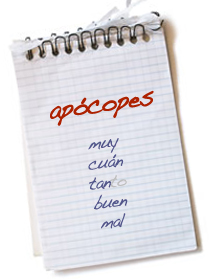Archive for May, 2012
Review: Dichos y refranes populares Posted by Adir on May 11, 2012

Spanish is full of dichos and refranes populares. Here are some of them: “El que con lobos anda aullar se enseña.” “Al mal tiempo buena cara.” “Siempre quiebra la soga por lo más delgado.” “A buen sueño no hay mala cama.” “Al que a buen árbol se arrima, buena sombra no cobija.” “Querer es poder.”…
Adivina qué idioma hablamos. Posted by Magda on May 10, 2012
Today we are going play a guessing game. I´d like you to read this piece of writing, and try to tell me what language is being used, and try to tell me the meaning of every “odd” word you find in the text. We will talk about it very soon, and I will give youthe…
Spanish Lesson Intermediate 33 Spanish Superlatives Posted by Laura & Adam on May 8, 2012
In this Spanish video lesson we will look at Spanish Superlatives – “Superlativos”. A “Superlative” is the form of an adjective or adverb that indicates that the person, thing, or action referred to has the quality of the adjective or adverb to a degree greater than that of anything it is being compared to. There…
La apócope Posted by Adir on May 8, 2012

Three years ago I wrote about la apócope in Spanish and today I’m going to review some rules and give you more examples. La apócope is when the last word or syllable of a word is lost, due to phonetic reasons. In Spanish the following words are apocopadas (shortened): 1 – Some words that come…
How to use the verb “pegar” in Spanish Posted by Adir on May 7, 2012

¡Buenos días! ¿Cómo están Uds. hoy? Today we are going to learn the several uses of the verb pegar. Pegar is a very common and useful verb in Spanish so let’s get down to work! Here are some useful collocations and uses of pegar: The first idea that comes to mind when we talk about…
Vocabulary differences in Latin American Spanish Posted by Adir on May 4, 2012

¡Hola! ¿Cómo estás? Latin American Spanish is a little different from the Spanish spoken in Spain and one of these differences happens in the verb coger. In Spain it means to take, to get, to fetch. In Latin American it is a very vulgar way to say “to have sex” (got my drift, right?). So…
How to use the verbs “haber” and “tener” Posted by Adir on May 3, 2012

The verbs haber and tener are used to express necessity or obligation. Haber – We use hay que to express necessity and we can replace it with es necesario (it’s necessary). Hay que estudiar mucho para aprender bien el español. [You need to study a lot to learn Spanish well.] Hay que cambiar la ventana…


